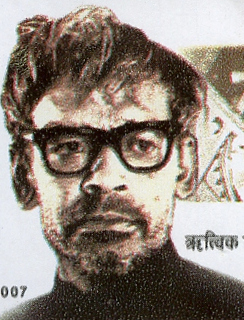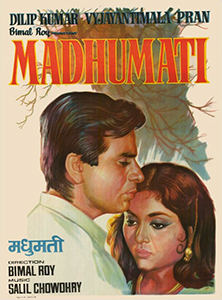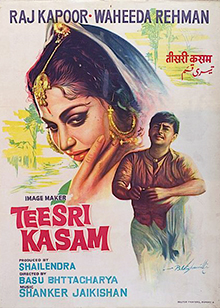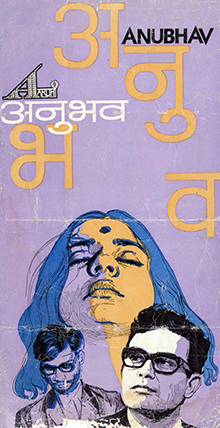Related Research Articles

Bandini is a 1963 Hindi drama film directed and produced by Bimal Roy.It stars Nutan, Ashok Kumar and Dharmendra. The film tells the story of a woman prisoner serving life imprisonment for murder, Kalyani, the all suffering, selfless, sacrificing and strong, yet weak Indian woman. She must make a choice between two very different men, Devendra (Dharmendra), the loving prison doctor, and Bikash, a man from her past.
Bimal Roy was an Indian film director. He is particularly noted for his realistic and socialistic films such as Do Bigha Zamin, Parineeta, Biraj Bahu, Devdas, Madhumati, Sujata, Parakh and Bandini, making him an important director of Hindi cinema. Inspired by Italian neo-realistic cinema, he made Do Bigha Zamin after watching Vittorio De Sica's Bicycle Thieves (1948). His work is particularly known for his mise en scène which he employed to portray realism. He won a number of awards throughout his career, including eleven Filmfare Awards, two National Film Awards, and the International Prize of the Cannes Film Festival. Madhumati won 9 Filmfare Awards in 1958, a record held for 37 years.

Ritwik Kumar Ghatak was an Indian film director, screenwriter, actor and playwright. Along with prominent contemporary Bengali filmmakers like Satyajit Ray, Tapan Sinha and Mrinal Sen, his cinema is primarily remembered for its meticulous depiction of social reality, partition and feminism. He won the National Film Award's Rajat Kamal Award for Best Story in 1974 for his Jukti Takko Aar Gappo and Best Director's Award from Bangladesh Cine Journalist's Association for Titash Ekti Nadir Naam. The Government of India honoured him with the Padma Shri for Arts in 1970.

Hrishikesh Mukherjee was an Indian film director, editor and writer. He is regarded as one of the greatest filmmakers of Indian cinema. Popularly known as Hrishi-da, he directed 42 films during his career spanning over four decades, and is named the pioneer of the 'middle cinema' of India. Renowned for his social films that reflected the changing middle-class ethos, Mukherjee "carved a middle path between the extravagance of mainstream cinema and the stark realism of art cinema".

Madhumati is a 1958 Indian Hindi-language paranormal romance film directed and produced by Bimal Roy, and written by Ritwik Ghatak and Rajinder Singh Bedi. The film stars Vyjayanthimala and Dilip Kumar in lead roles, with Pran and Johnny Walker in supporting roles. The plot focuses on Anand, a modern man who falls in love with a tribal woman named Madhumati. But they face challenges in their relationship finally leading to a paranormal consequence. The film was ranked 11th in the Outlook Magazine's 25 leading Indian directors' poll for selecting Bollywood's greatest films in 2003.

Teesri Kasam is a 1966 Hindi language drama film directed by Basu Bhattacharya and produced by lyricist Shailendra. It is based on the short story Mare Gaye Gulfam, by the Hindi novelist Phanishwarnath Renu. The film stars Raj Kapoor and Waheeda Rehman. The duo Shankar–Jaikishan composed the film's score. The film's cinematography was done by Subrata Mitra, dialogues were written by Phanishwarnath Renu and the screenplay is by Nabendu Ghosh.

Sanjana Kapoor is an Indian theatre personality and former film actress. She is the daughter of actors Shashi Kapoor and Jennifer Kapoor. She ran the Prithvi Theatre in Mumbai from 1993 to February 2012.

Basu Bhattacharya was an Indian film director of Hindi films. He is perhaps best known for his 1966 film Teesri Kasam, starring Raj Kapoor and Waheeda Rehman, which won the National Film Award for Best Feature Film in 1967. The most popular and critically acclaimed film which he directed remains Avishkaar, starring Rajesh Khanna and Sharmila Tagore, which received five stars in Bollywood Guide Collections and for which Khanna received the Filmfare Best Actor Award in 1975.

Amit Bose was an Indian filmmaker, film director and editor, who directed all-time classics like Abhilasha (1968) and, as an Editor, worked on movies like Madhumati (1958), Sujata (1959), Parakh (1960), Usne Kaha Tha (1960), Kabuliwala (1961), Prem Patra (1962), Bandini (1963) and Shakespeare Wallah (1965). He worked as Chief Film Editor for Bimal Roy and with several other directors including Sanjay Khan.

Anubhav (transl. Experience) is a 1971 Hindi-language film by noted director Basu Bhattacharya, which stars Sanjeev Kumar, Tanuja and Dinesh Thakur. The film was the first part of Basu Battacharya's introspective trilogy on marital discord in an urban setting, which included Avishkaar (1973) and Griha Pravesh (1979); and went on to win the 1972 National Film Award for Second Best Feature Film and started a trend later picked up even by the mainstream cinema. The film is also remembered for playback singer Geeta Dutt's finest songs composed by music director Kanu Roy with lyrics from Gulzar, like "Meri Jaan Mujhe Jaan Na Kaho", "Koi Chupke Se Aake" and "Mera Dil Jo Mera Hota".

Gulzar is an Indian Urdu poet, lyricist, author, screenwriter, and film director known for his works in Hindi cinema. He is regarded as one of greatest Urdu poets of this era. He started his career with music director S.D. Burman as a lyricist in the 1963 film Bandini and worked with many music directors including R. D. Burman, Salil Chowdhury, Vishal Bhardwaj and A. R. Rahman. Gulzar also writes poetry, dialogues and scripts. He directed films such as Aandhi and Mausam during the 1970s and the TV series Mirza Ghalib in the 1980s. He also directed Kirdaar in 1993.

Aditya Bhattacharya is an Indian film director and screenwriter, most known for his feature film, Raakh (1989), starring Aamir Khan and Pankaj Kapur, which garnered three National Film Awards.

Aastha: In the Prison of Spring is a 1997 Bollywood film, produced and directed by Basu Bhattacharya. The film stars Rekha, Om Puri, Navin Nischol and Daisy Irani in the main roles. The film went on to receive both critical acclaim and commercial success, the latter of which had eluded Basu in his last few films. Subsequently, spurred on by this success, Basu was even planning to remake the film in English, though he died in June 1997, at the age 62. The film's success was described as blurring the gap between Indian art and commercial cinema, where art film makers, dealing with serious issues, used a musical format to make the film more commercially appealing, thus reaching a wider audience. Rekha received a nomination of 1997 Star Screen Award for Best Actress.
Yahudi Ki Ladki is a historical Urdu play by Agha Hashar Kashmiri, on the theme of persecution of Jews by the Romans. It was first published in 1913. The play became his best known work, and a classic in Parsi-Urdu theatre.
Sudhendu Roy (1921–1999) was a noted Indian film director, art director and production designer in Hindi cinema, most known for his realistic art direction in auteur Bimal Roy's films, like Sujata (1959), Madhumati (1959) and Bandini (1963), and glitzy work in films Subhash Ghai's Karz (1980) and Karma (1986) to Yash Chopra's Silsila (1981), Chandni (1989) and Lamhe (1991). He won the Filmfare Award for Best Art Direction thrice for, Madhumati (1959), Mere Mehboob (1964) and Sagina (1975).
Karan Dewan was an Indian cinema actor in Hindi films. He worked in over seventy films from 1941 to 1979. He started as a journalist while still in college, editing a film-based magazine in Urdu. His brother was the film producer and director Jaimani Dewan.
Baap Beti is a 1954 Indian Hindi film directed by Bimal Roy. The film was produced by Gopi Rohra and stars Nalini Jaiwant, as well as Asha Parekh as a child artist.
Hamrahi (transl. Companion/Partner), is a 1945 Hindi social drama film of Indian Cinema. The film was a bilingual, and was a remake of its popular Bengali version called Udayer Pathey (1944). Bimal Roy, after working as a cinematographer with New Theatres, Calcutta, launched into feature film direction. Udayer Pathey was Roy's debut film as a director in Bengali films, while Hamrahi was his first directorial venture in Hindi cinema. The original story and dialogues for Bengali version were written by Jyotirmoy Roy, with the dialogues in Hindi written by Mohanlal Bajpai. Produced by New Theatres, Calcutta, the cinematographer was Bimal Roy. The music direction was by Raichand Boral and the lyrics were by Zakir Husain. The film included Rabindranath Tagore's song, "Jana Gana Mana", even before it became the national anthem of India.

Shoma A. Chatterji is an Indian film scholar, author and freelance journalist. She has been the recipient of a number of awards including the National Film Award for Best Film Critic in 1991 and the National Awards for Best Writing on Cinema for her study of the works of Aparna Sen in the publication, Parama and Other Outsiders: The Cinema of Aparna Sen (2002). Notably, she is the only woman to have won both the national awards. She is the author of several biographies including those on Pramathesh Barua, Ritwik Ghatak and Suchitra Sen.
Maithili Rao is an Indian freelance film critic, writer, journalist and former English lecturer based in Mumbai. She has worked for several publications, including The Hindu, Frontline, Film Comment, the Sunday Observer, Gentleman, The Independent, and Screen.
References
- ↑ "Rinki Roy Bhattacharya" . Retrieved 7 September 2014.
- ↑ Daughter to keep Bimal Roy's legacy alive Reuters, 10 February 2008.
- ↑ "Rinki Roy Bhattacharya". Penguin Books India. Retrieved 7 September 2014.
- ↑ Independent women too are victims of domestic violence The Times Of India, 25 November 2006.
- ↑ Father’s pictures The Tribune, 26 August 2001.
- ↑ "Hero worship". Mint . 4 January 2013. Retrieved 7 September 2014.
- ↑ Can you beat that? Telegraph, 30 May 2004.
- ↑ Reema Gehi (20 June 2014). "First in Mirror: Enter Roy's world". Mumbai Mirror. Retrieved 7 September 2014.